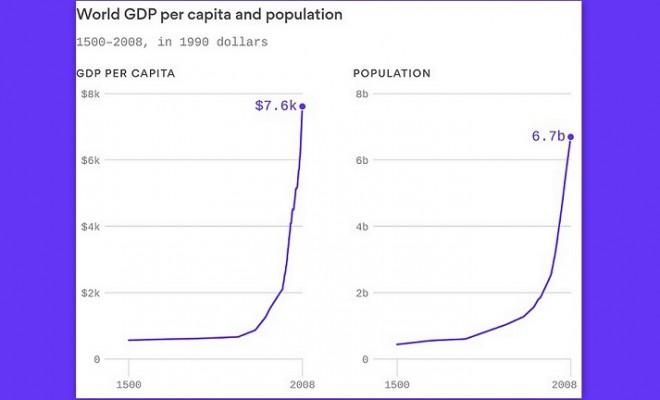
The new threat to capitalism
In what would have been widely dismissed as absurd even a year ago, a mainstream consensus has suddenly swept the world that the core of the global economic system has gone terribly awry, requiring a basic shakeup of capitalism.
- But the problem may befar more fundamental than an excess of human ruthlessness, as many believe. Instead, experts say, capitalism is under another, more intractable assault — by inexorable long-term population trends that may kill the ability of economies to grow.
The big picture: As we have reported, a reckoning has emerged for capitalism as practiced — people across the U.S., Europe and elsewhere say something is fundamentally wrong with their living standards and the size of companies, and CEOs and politicians suddenly believe they must act.
- In an announcement today, 181 of the top U.S. CEOs said they are changing their business objective — rather than solely seeking to satisfy shareholders, they will consider the desires of other constituencies such as communities and employees.
- And in a report this afternoon, WSJ reports that U.S. state attorneys general plan to proceed with a probe of Big Tech companies for alleged anti-competitive behavior.
But experts suggest that such do-gooderism and investigations will be insufficient to turn the tide against an underlying, almost-unnoticed threat to the economic system that has fueled the entire industrial age.
The new threat: Most of us know that global wealth surged starting in the 19th century. What is less publicized is that the explosion was accompanied by a similar breakout in population, and economists connect the two — when population grows, GDP has tended to rise with it. (see chart)
- Shrinking, aging:But now, population growth across numerous countries — especially in the West — has stalled. By 2040, demographers say, the number of countries with shrinking populations will rise almost 50% — to 67, from about 46 now. At the same time, by 2050, about a quarter of the world population will be 60 or older.
- Why that hurts capitalism:Fewer people mean less buying; the elderly also buy less than younger people. Hence, economies are likely to stagnate, then shrink.
- “No capitalist economic systemoperates on the presumption that there will be zero or negative growth. No one deploys investment capital or loans expecting less tomorrow than today,” writes Zachary Karabell, president of River Twice Research, in an essay for Foreign Affairs.
What’s next: Richard Jackson, president of the Global Aging Institute, says that, as long as countries do not go protectionist, companies will get around the problem for decades by exporting to still-growing populations such as sub-Saharan Africa.
Darrell Bricker, co-author of “Empty Planet” and global CEO of Ipsos, the polling company, said companies could also do better at marketing to the elderly. “When was the last time you saw an ad [targeting] a 70-year-old woman?”
The bottom line: Capitalism is unlikely to vanish. But it could end up looking a lot different.
Aiming for happiness: Ruchir Sharma, chief global strategist for Morgan Stanley Investment Management, said that, rather than growth, a better measure of public well-being amid population decline is per capita income.
- “The happiest countriesin the world are also the nations with the highest per capita income, from Switzerland to Norway.”
- “It’s only a problem because people can’t imagine a capitalism that does anything else [but grow],” said Richard Cincotta, former lead demographer with the National Intelligence Council, and currently a senior fellow at the Stimson Center.
Info photo: Data: Statistics on World Population, GDP and Per Capita GDP, 1-2008 AD, Angus Maddison; Chart: Axios Visuals
Πηγή: axios.com




